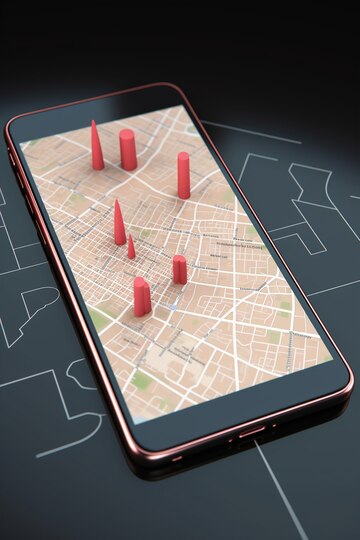Rescue and Assistance Stories Using GPS Trackers: Real-Life Examples





In recent years, GPS trackers have become indispensable tools for ensuring the safety and security of individuals and families. These devices, often integrated with location tracking apps, provide real-time data that can be crucial in emergency situations. Whether it's locating a lost child, tracking a hiker in distress, or coordinating rescue efforts during natural disasters, GPS trackers have proven their worth time and time again. This article explores real-life examples of how family GPS trackers and family GPS locators have been instrumental in saving lives and providing assistance in critical situations.
The Role of GPS Trackers in Modern Safety
GPS technology has revolutionized the way we think about safety and security. Originally developed for military use, GPS has since found its way into everyday life, where it serves a variety of purposes. From navigation to asset tracking, GPS is now an integral part of modern technology. However, one of its most important roles is in personal safety, where it can be used to track the location of individuals in real time.
The ability to monitor someone's location through a location tracking app provides a safety net that can be crucial in emergencies. Whether it's a child who has wandered off, an elderly person with dementia who has gone missing, or an adventurer who finds themselves in a dangerous situation, GPS trackers provide a way to quickly locate and assist those in need.
Real-Life Rescue Stories with GPS Trackers
1. Finding Lost Children: A Parent’s Worst Nightmare Averted
One of the most common uses of family GPS trackers is to monitor the whereabouts of children. In crowded places like amusement parks, shopping malls, or large public events, it’s easy for children to become separated from their parents. Fortunately, GPS trackers have repeatedly proven to be invaluable in these situations.
The Story of Lost Child at a Theme Park
In 2019, a family visiting a popular theme park in Florida experienced every parent’s worst nightmare when their 6-year-old son wandered off while they were waiting in line for a ride. Despite their best efforts to locate him, the crowded environment made it nearly impossible to spot the child.
Thankfully, the parents had equipped their son with a small, wearable family GPS locator before entering the park. As soon as they realized he was missing, they used the accompanying location tracking app on their smartphones to pinpoint his location. The app showed that he had wandered to a nearby gift shop. Within minutes, park security was able to locate the child and reunite him with his family.
This incident highlights the importance of GPS trackers in preventing what could have been a tragic outcome. The ability to quickly locate a missing child in a large, crowded area is invaluable, and it underscores the peace of mind that such technology provides to parents.
How GPS Trackers Enhance Child Safety
GPS trackers for children are often designed with features specifically aimed at enhancing safety:
- Real-Time Location Tracking: Parents can monitor their child's location in real-time, receiving updates every few seconds.
- Geo-Fencing: Set up safe zones and receive alerts if the child leaves the designated area.
- Panic Button: Many devices come with an SOS button that the child can press to send an immediate alert to the parents.
These features have helped countless families avoid potentially dangerous situations and have provided reassurance in environments where it’s easy to lose sight of children.
2. Rescuing Hikers in Distress
Outdoor adventures like hiking, camping, and exploring remote areas come with inherent risks, especially when individuals venture into unfamiliar or challenging terrain. GPS trackers have become essential tools for adventurers, enabling them to share their location with loved ones and call for help if they find themselves in trouble.
The Tale of the Lost Hiker in the Rockies
In 2020, a solo hiker set out to explore a remote trail in the Rocky Mountains. Despite being well-prepared, she lost her way after straying off the marked path. As daylight faded and temperatures dropped, the situation became increasingly dangerous. Fortunately, she had a GPS tracker with her, which she used to send an SOS signal along with her exact coordinates.
Search and rescue teams were able to locate her within hours, thanks to the real-time location data provided by the tracker. The hiker was found safe, albeit cold and shaken, but without the GPS device, the outcome could have been much worse.
The Importance of GPS Trackers in Outdoor Safety
For outdoor enthusiasts, GPS trackers offer several critical benefits:
- Location Sharing: Share your real-time location with family or friends, so they know where you are at all times.
- Emergency Alerts: Send an SOS signal with your coordinates to emergency services or pre-designated contacts.
- Route Recording: Record your path and backtrack if you get lost.
These features not only enhance the safety of those who enjoy the outdoors but also make it easier for rescue teams to respond quickly and effectively in case of emergencies.
3. Assisting the Elderly and Individuals with Dementia
GPS trackers are increasingly being used to monitor elderly individuals, particularly those with cognitive impairments such as Alzheimer’s or dementia. These conditions can cause confusion and disorientation, leading to situations where the individual may wander away from home and become lost.
Reuniting a Wandering Elderly Man with His Family
In 2018, an 82-year-old man with dementia wandered away from his home in a suburban neighborhood. His family quickly noticed his absence and began searching for him, but after several hours with no success, they contacted the authorities.
Fortunately, the man was wearing a family GPS tracker that his family had recently purchased. Using the tracker’s location data, police were able to locate him in a nearby park, disoriented but unharmed. The quick response, made possible by the GPS tracker, ensured that the man was safely returned to his family without any harm.
How GPS Trackers Support Caregivers
For caregivers of elderly individuals, GPS trackers offer several advantages:
- Real-Time Monitoring: Keep track of the individual's location in real-time, reducing the risk of them getting lost.
- Geo-Fencing Alerts: Set up safe zones around the home or neighborhood, with alerts if the individual leaves the area.
- Two-Way Communication: Some GPS trackers include a two-way communication feature, allowing caregivers to speak directly with the individual if they become disoriented.
These tools provide peace of mind for families and caregivers, knowing that they can quickly locate and assist their loved ones in case of an emergency.
4. GPS Trackers in Natural Disasters
Natural disasters, such as hurricanes, earthquakes, and floods, often result in chaotic and dangerous situations where people can become separated from their families or trapped in inaccessible areas. GPS trackers have proven to be invaluable in these scenarios, helping rescue teams locate and assist those in need.
The Role of GPS Trackers During Hurricane Katrina
Hurricane Katrina, which struck the Gulf Coast of the United States in 2005, was one of the most devastating natural disasters in recent history. In the aftermath of the storm, thousands of people were displaced, and communication networks were severely disrupted. In this chaotic environment, GPS trackers played a crucial role in rescue and recovery efforts.
Several families who had equipped their loved ones with GPS trackers before the storm were able to use these devices to locate and reunite with them. Additionally, rescue teams used GPS data to navigate through flooded areas and reach stranded individuals who had activated their GPS trackers’ SOS signals.
While GPS technology was not as advanced then as it is today, the use of GPS trackers during Hurricane Katrina highlighted their potential in disaster response and recovery.
How GPS Trackers Enhance Disaster Response
In natural disasters, GPS trackers offer the following benefits:
- Emergency Location Tracking: Quickly locate individuals who are trapped or in need of assistance.
- Coordination of Rescue Efforts: Rescue teams can use GPS data to plan and execute more efficient search and rescue missions.
- Reuniting Families: Help families locate and reunite with loved ones who have become separated during the disaster.
As GPS technology continues to advance, its role in disaster response is likely to become even more critical, providing valuable tools for saving lives in the most challenging conditions.
5. GPS Trackers in Law Enforcement and Public Safety
Law enforcement agencies and public safety officials have also embraced GPS technology as a tool for enhancing community safety. From tracking suspects to locating missing persons, GPS trackers have become an essential part of modern policing.
Tracking a Kidnapping Victim with a Hidden GPS Tracker
In 2021, a woman was kidnapped from a parking lot in a major city. Unbeknownst to her captors, she had a GPS tracker hidden in her purse. As soon as the kidnapping was reported, law enforcement was able to use the GPS tracker to follow the victim's movements in real time.
Within hours, the police tracked the vehicle to an isolated area outside the city, where they successfully rescued the victim and apprehended the suspects. The GPS tracker played a critical role in the rapid resolution of the case, demonstrating its value in law enforcement operations.
How GPS Trackers Aid Law Enforcement
GPS trackers assist law enforcement in several key ways:
- Real-Time Tracking: Monitor the movements of suspects or vehicles involved in criminal activities.
- Evidence Collection: GPS data can be used as evidence in court to support investigations and prosecutions.
- Locating Missing Persons: Quickly locate missing individuals, especially in cases involving children or vulnerable adults.
As GPS technology continues to evolve, it is likely to play an even greater role in public safety, providing law enforcement with powerful tools to protect communities and respond to emergencies more effectively.
The Future of GPS Trackers in Rescue and Assistance
The stories highlighted in this article demonstrate the significant impact that GPS trackers have had on rescue and assistance efforts across various situations. As technology continues to advance, the capabilities of GPS trackers are expected to expand, offering even more sophisticated tools for ensuring safety and providing help when it is needed most.
Advancements in GPS Technology
Future advancements in GPS technology are likely to focus on improving accuracy, expanding coverage, and enhancing the integration of GPS with other safety systems. Some of the key developments to watch for include:
- Improved Accuracy: Advances in satellite technology and data processing are expected to provide even more precise location tracking, reducing the margin of error to just a few centimeters.
- Global Coverage: The expansion of satellite networks, including the deployment of low Earth orbit (LEO) satellites, will improve GPS coverage in remote and hard-to-reach areas.
- Integration with AI and Machine Learning: The integration of GPS data with artificial intelligence (AI) and machine learning algorithms will enable more predictive and proactive safety measures, such as automated alerts and dynamic route planning.
The Growing Role of GPS in Everyday Life
As GPS technology becomes more advanced and accessible, its role in everyday life is expected to grow. From enhancing personal safety to improving emergency response, GPS trackers are likely to become an even more integral part of our daily routines. Whether it's through standalone devices, wearable technology, or smartphone apps, GPS trackers will continue to provide peace of mind and security to individuals and families around the world.
Moreover, the integration of GPS with other smart technologies, such as home automation systems and connected vehicles, will create new opportunities for enhancing safety and convenience. For example, future GPS trackers could automatically alert emergency services if they detect unusual behavior, such as a fall or a sudden deviation from a normal route.

Conclusion: The Life-Saving Potential of GPS Trackers
The real-life stories shared in this article underscore the life-saving potential of GPS trackers. Whether it's locating a lost child, rescuing a hiker in distress, assisting an elderly family member, or responding to a natural disaster, GPS trackers have proven to be invaluable tools for providing safety and assistance in critical situations.
As GPS technology continues to evolve, its applications will only expand, offering new and innovative ways to protect and support individuals and families. By investing in a reliable family GPS tracker or location tracking app, you can enhance the safety and security of your loved ones, providing peace of mind in an increasingly complex world.
Whether you're looking to monitor your child's whereabouts, ensure the safety of an elderly relative, or simply stay connected during a family outing, GPS trackers offer a powerful solution that can make a real difference in your life. As the stories in this article demonstrate, the decision to use a GPS tracker can be life-saving, offering timely assistance and ensuring that help is always just a few clicks away.
In a world where safety is paramount, the value of GPS trackers cannot be overstated. They are more than just gadgets—they are lifelines that provide reassurance, support, and, in many cases, the difference between tragedy and rescue.




Lets try Findee
for Free
Download our latest version and please don’t
forget to rate :)

Subscribe Newsletter
Subscribe to the newsletter to be the first to receive interesting news
Let's try out!
Copyright © All Rights Reserved



